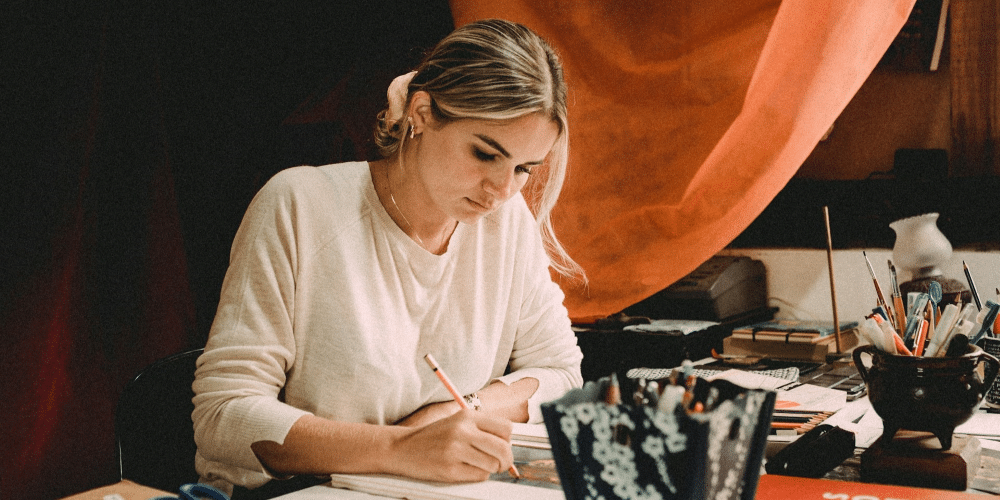Image commercially licensed from Unsplash
Jeff Glozzy was born and raised in Norfolk, Massachusetts. From an early age, Jeff fostered a fierce passion for the arts; both creating his own artwork, and appreciating the work of others.
After finishing high school, Jeff enrolled in Villanova University where he completed a Bachelor’s degree in Communications. He was then accepted into Boston University, eventually earning a Master’s degree in Arts Education. While at Boston University, Jeff Glozzy received the distinction of being named a Constantin Alajalov Scholar, which is an academic accolade given to those few students who demonstrate exceptional proficiency in the fine arts.
Upon completing his education, Jeff began a career in sales. However, in doing so, he had to put aside his naturally endowed artistic talents, instead focusing on his new career. But even as he established himself as a premiere salesperson, easily earning a comfortable living within the notoriously competitive sales industry, his passion for the arts never diminished.
After spending almost a decade of his life as a salesperson, Jeff Glozzy made the choice to switch careers, embrace his innate creativity, and apply himself to becoming a serious artist. These days, Jeff is developing a business based on creating his own unique style of artwork and presenting it for public consumption. He is currently assembling a portfolio featuring not only his latest pieces, but also some of his earliest works. Now living his life on his own terms, Jeff finds himself with a rejuvenated sense of purpose, and is creating exciting new artwork at a steady pace.
What inspired you to found your own business based around creating original works of art?
I’ve always been an artist at heart. After spending ten years of my life working in sales, I just decided I wanted to pursue my life-long dream and embrace creating art as my profession.
Can you explain what keeps you motivated?
When trying to translate my ideas into reality, I first embark on a journey of self-exploration—really trying to understand who I am as a person. That kind of exploration brings with it enormous clarity and helps ideas to flow.
Can you provide some important lessons you have learned as an artist and entrepreneur?
My success thus far is based on putting out good content. I’ve expanded my following on Instagram by creating original artwork and posting it in a high-quality manner. I try to present my art in a way that people really want to see online, but in the end, it’s all about content. Then, obviously, I have to promote it. In that respect, effectively utilizing social media has helped me grow in my career.
What are some tricks that enable you to preserve a healthy work life balance?
I think the time I spend with my family makes me more productive with my work. I have a fulfilling, engaging life outside of what I do for a living. Without the enrichment my family gives me, I think my productivity would suffer, because what would be the point of working if I didn’t have anything to look forward to at the end of the day?
Are there any current trends in society that excite you?
The development of artificial intelligence is exciting to me, but also terrifying. Because AI is advancing so rapidly, it’s soon going to be able to do many things that people do now—and much quicker and better. It’ll threaten the careers of a lot of people because of its capabilities. Among many other things, AI can make art, which really hits home with me.
But in many ways, artificial intelligence is just like any other new technology throughout history, like personal computers or the internet. When those inventions came along, people had similar concerns. Although AI has the potential to be a much more disruptive force, humans are good at adapting to change. AI is just another technology that must be accepted and embraced.
Are there any obstacles you’re particularly proud of overcoming during the course of your career?
For a long time, I worked in sales. Even though I was pretty good at selling things, I knew the industry wasn’t a good fit for me. Eventually, I recognized that I needed to do something creative and something where I was helping people. That was when I realigned my professional path with my natural passions and gifts. Since then, I haven’t looked back. It’s the best decision I’ve ever made.
Can you relate some sage advice that has served you well?
“Wholly embrace being yourself. Don’t try to change who you are to appeal to anybody else. If you try to be someone you’re not, you’ll end up having an awful time.” That advice was given to me by a very wise person, and it’s undeniably true.
Is there a piece of advice you’d like to impart to our readers?
All it takes to succeed in any endeavor is a firm belief in yourself and the courage to take some initiative. If a person has a passion for their work, a strong will, and the right motivation, they will eventually succeed in their career. You don’t need to have superhuman talent.
What is the most important overall lesson you have learned, whether it’s regarding business or anything else?
Everybody has a responsibility to be thoughtful about existence and to have compassion toward their fellow human beings. Unfortunately, I don’t see many people putting a lot of effort into that, or really anything beyond what they do on a day-to-day basis. While I think people contemplate the important things in life to a certain extent, it seems to me that most of them stop doing so after a while—probably because they’re busy with work, family, and simply getting through each day. But I think it’s important that people make an effort to delve deeper and think about the different aspects of life.








